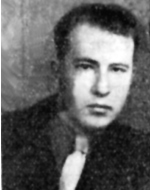Ovitz, David
Son of-Batya and Menachem, was born in 1921 in a village in the Romanian part of Marmarosh district. As a child, he was circumcised by his parents and grew up in the home of his older brother in the city of Bistritz, Transylvania. Where he studied at Chadarim, in the elementary school and from the age of 14 to 17 in Yeshiva. After that, he learned how to cut leather for shoes and worked in his profession until 1942. At that time he was drafted into a forced labor company in the Hungarian army. With his friends he was transferred to the Germans and tortured in various camps until he was liberated in May 1945 by the American army in Upper Austria. David contracted typhus and when he recovered, he moved to Italy with the help of the Jewish Brigade. After shaking and waiting for a long time, he immigrated to Israel in March 1947 on the illegal immigrant ship Shabtai Lozinski and was among those who managed to escape from the British and board the Nitzanim beach. He spent 11 days at Kibbutz Yavneh and then moved to Bnei Brak and settled down at work. In March 1948, he was drafted into the Alexandroni Brigade, was attached to a combat battalion and participated in its various operations. His ambition was to establish a family in Israel after his discharge from the army, so that he would no longer be alone in the world, and in the meantime he continued to fulfill his duty. During the “Horev” operation, a “liquidation” operation was carried out to liquidate the “Faluja pocket,” in which an Egyptian brigade was besieged. The attack took place on the eastern flank of the “pocket” in the area of Iraq al-Manshiyya. The Alexandroni forces broke into the village from the south and took over part of it, but their assault on the hill north of the village was repulsed. Meanwhile, the Egyptians recovered and attacked and forced our forces to withdraw. Part of the force remained trapped inside the village. In this battle David fell on the 28th of Kislev 5709 (December 28, 1948) and was buried in Faluja. On the 17th of Kislev 5710 (8.12.1949) he was transferred to the eternal rest of the military cemetery at Nahalat Yitzhak.
